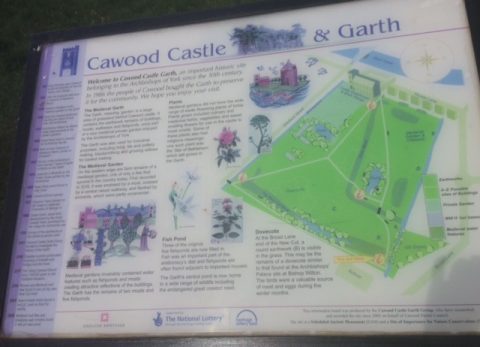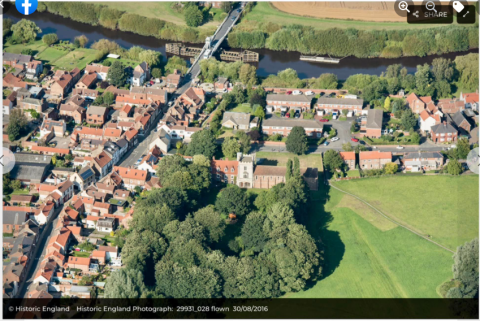The Parish Council works as a whole based on collective responsibility, but each councillor has additional areas of responsibility undertaken on behalf of all.
Councillors attend meetings and courses in their own time and fulfil their roles as Parish Councillors in an unpaid capacity.
Cawood Parish Council Roles & Responsibilities
Chairman: Lesley Dennon
Vice Chairman: Iain Brown
Playing Field Wardens: Lesley Dennon, Chris Lunn
Playing Field Liaison Committee: Lesley Dennon, Iain Brown (Chairman)
Martin Ward, Chris Lunn (Addison Lloyd, reserve)
Cemetery Wardens: Tony Horsfield, Addison Lloyd
Castle Garth Wardens: Chris Luker, Tony Horsfield, Addison Lloyd
Local Councils Association: Iain Brown, Sarah McLoughlin
Cawood Grows Together: Lesley Dennon, Chris Shepherd
Old Boys’ School Committee: Tony Horsfield (Chairman), Sarah McLoughlin
Website Administrator: Lesley Dennon, Chris Shepherd
Internal Control/Finance: Iain Brown, (Lesley Dennon, support)
Staffing Committee: Iain Brown, Tony Horsfield, Sarah McLoughlin
Highways and Footpaths: Iain Brown
The Parish Clerk makes regular checks on the defibrillators.
Updated June 2024
Cawood PC Councillor JD June 2023
Playing Fields:
Cllrs. Lunn and Dennon are the Wardens. They inspect buildings and play equipment and serve on the Playing Field Liaison Committee together with Cllrs. Ward and Brown. Cllr Lloyd attends as reserve in the absence of a voting Committee member. Other areas of responsibility have included submitting applications for tree works and buying new trees, applying for lottery grants, sourcing play and gym equipment, picnic tables and bird nesting boxes, developing a “fairy” grotto.
Wardens do not deal with anti social behaviour or patrol areas: please ring 101 to assist our community police officer to build up a profile for the village. Loud music containing expletives will be regarded as a public order offence.

The Garth:
Garth Wardens are Cllrs. Luker, Lloyd and Horsfield. Wardens liaise with farmers for sheep grazing and grass cutting, submit tree works applications, ensure regulations are adhered with.
Cllr. Dennon acts as liaison for the Guardians of the Garth and Gill Green Project.

Old Boys’ School:
Cllrs. Horsfield is Chairman of the O.B.S. Committee. Cllr. McLoughlin is also on the committee. The PC Clerk is responsible for collating bookings. The OBSMC are responsible for collecting payments, checking health and safety issues, upgrading facilities for users.
Cemetery:
Cllrs. Lloyd and Horsfield are Wardens of the Cemetery ensuring maintenance and safety issues are addressed. The PC Clerk administrates the Cemetery. Cllrs Dennon & Horsfield have also undertaken training to support the Clerk.
Cawood Grows Together:
Cllrs. Shepherd & Dennon oversaw the transition from Cawood in Bloom and launch (delayed by pandemic) of Cawood Grows Together. They oversee adoption of planters, maintenance of planters and liaise with adopters. Cllrs. Shepherd & Dennon have also planted many bulbs at the Cemetery, Foreshore, in front of the Castle (by permission with Landmark Trust) and at the roundabout. In addition, they look after several large beds and planters in the village and Cllr Dennon has initiated and planted a snowdrop walk along the Garth path.
Website Administrators:
Cllrs. Dennon and Shepherd act as administrators for our website together with the Clerk.
The website data is audited annually. (last completed Aug 17th 2023)
Our website and Accessibility:
https://parishcouncilwebsites.org.uk/accessibility-statement/
Conformance status
The Web Content Accessibility Guidelines (WCAG) defines requirements for designers and developers to improve accessibility for people with disabilities. It defines three levels of conformance: Level A, Level AA, and Level AAA.
Parish Council Websites is fully conformant with WCAG 2.1 level AA.
Fully conformant means that the content fully conforms to the accessibility standard without any exceptions
Cawood Parish Council is committed to making its website accessible, in accordance with the Public Sector Bodies (Website & Mobile Applications) (No 2) Accessibility Regulations 2018.
These Regulations do not apply to the following content of a website or mobile application of a public sector body—
(a)office file formats published before 23rd September 2018, unless such content is needed for active administrative processes relating to the tasks performed by the public sector body;
(b)pre-recorded time-based media published before 23rd September 2020;
(c)live time-based media;
(d)online maps and mapping services, as long as essential information is provided in an accessible digital manner for maps intended for navigational use;
(e)third-party content that is neither funded nor developed by, nor under the control of, the public sector body;
(f)reproductions of items in heritage collections that cannot be made fully accessible because of either—
(i)the incompatibility of the accessibility requirement with either the preservation of the item concerned or the authenticity of the reproduction; or
(ii)the unavailability of automated and cost-efficient solutions that would easily extract the text of manuscripts or other items in heritage collections and transform it into content compatible with the accessibility requirement;
(g)content of extranets and intranets published before 23rd September 2019, until such websites undergo a substantial revision; and
(h)content of websites and mobile applications qualifying as archives.
This statement was prepared on July 5th 2019. It was last reviewed July 24th 2024
Yorkshire Local Council Association:
Cllr McLoughlin and Cllr Brown attend branch meetings to enable the P.C. to keep up to date with national and local council issues, regulations etc.

Internal Control: Under the Accounts and Audit Regulations all councils and parish meetings must have a system of internal control.
Cllr. Brown, with some support from Cllr. Dennon, undertakes Internal Control and oversees finance matters
Staffing Committee:
Cllrs. Horsfield, Cllr Brown and Cllr McLoughlin exercise delegated power dealing with staffing matters.
In addition to these responsibilities, Councillors undertake “one off” tasks which can involve, for example:
organising litter picks and pond weed clearing, keeping notice boards up to date and organising new boards, organising bulb planting, taking part in the Christmas tree Festival, liaising with NYC over bridge closure, co-ordinating events such as beacon lighting and sourcing the memorial plaque for the Church. Councillors have ensured the new Christmas tree and lights are in place, overseen drainage issues at the Cemetery, instigated the creation of log piles for the Garth and new play pieces from the willow coppicing. The Queen’s Jubilee celebrations and beacon lighting and the king’s Coronation commemorations were undertaken including creating the digital walking trail “Walking in the Footsteps of Kings, Queens & Archbishops” . D Day anniversary commemorations were also organised. The PC is involved in supporting Halt Heronby.
Councillors attend training courses organised by the Y.L.C.A. and share their knowledge with colleagues.
Councillors attend meetings and courses in their own time and fulfil their roles as Parish Councillors in an unpaid capacity.
General Guidance for the role of Warden (1)
Some notes of explanation regarding the role of Parish Councillor:
Code of Conduct
Chapter 7 of Part 1 of the Localism Act 2011, which came into force on 1 July 2012, requires a “relevant authority” (which includes all types of local authority including parish and town councils) to promote and maintain high standards of conduct by members and co-opted members. Every relevant authority must adopt a code which is consistent with these principles: selflessness, integrity, objectivity, accountability, openness, honesty and leadership. There is no mandatory code, but local government representative bodies like NALC have published suggested codes. The Department for Communities and Local Government has issued guidance entitled Openness and transparency on personal interests which can be viewed on the DCLG website via GOV.UK: www.gov.uk/government/publications/openness-and-transparency-on-personal-interests-guidance-for-councillors
The main points of a typical code are as follows:
Selflessness
You must serve only the public interest and must never improperly confer an advantage or disadvantage on any person including yourself.
Objectivity
In carrying out public business you must make decisions on merit, including when making appointments, awarding contracts, or recommending individuals for rewards or benefits.
Accountability
You are accountable for your decisions and actions to the public and must submit yourself to whatever scrutiny is appropriate to your office.
Openness
You must be as open as possible about your actions and those of your council, and must be prepared to give reasons for those actions.
Honesty and integrity
You must not place yourself in situations where your honesty and integrity may be questioned, must not behave improperly and must on all occasions avoid the appearance of such behaviour.
Leadership
You must promote and support high standards of conduct when serving in your public post, in particular as characterised by the above requirements, by leadership and example in a way that secures or preserves public confidence.
A relevant authority may revise its existing code or adopt another one.
A principal authority must make arrangements for dealing with allegations of breaches of its code so that they can be investigated and decisions can be made about what action to take if a member is found to have broken the code. A local council does not have to make any such arrangements. There is no statutory sanction for breaking the code and no power for a relevant authority to suspend or disqualify a member.
Disclosable pecuniary interests
Every member of a relevant authority must declare any relevant pecuniary interests, called in the legislation “disclosable pecuniary interests”, he or she may have. The monitoring officer of the district or unitary authority in which a parish or town lies holds the register of such interests of the members of parish or town councils. The list of interests must be available for public inspection at all reasonable hours and be published on the authority’s website. If a local council has a website, details of those interests must be published there as well. Details of sensitive interests (see below) do not have to be disclosed but the register may state that a member has such an interest.
Disclosable pecuniary interests are prescribed by the Relevant Authorities (Disclosable Pecuniary Interests) Regulations 2012 (SI 2012/1464) and are as follows:
| Subject | Prescribed description |
| Employment, office, trade, profession or vocation | Any employment, office, trade, profession or vocation carried on for profit or gain. |
| Sponsorship | Any payment or provision of any other financial benefit (other than from the relevant authority) made or provided within the relevant period in respect of any expenses incurred by M in carrying out duties as a member, or towards the election expenses of M.
This includes any payment or financial benefit from a trade union within the meaning of the Trade Union and Labour Relations (Consolidation) Act 1992. |
| Contracts | Any contract which is made between the relevant person (or a body in which the relevant person has a beneficial interest) and the relevant authority-
(a) under which goods or services are to be provided or works executed; and (b) which has not been fully discharged. |
| Land | Any beneficial interest in land within the area of the relevant authority. |
| Licences | Any licence (alone or jointly with others) to occupy land in the area of the relevant authority for a month or longer. |
| Corporate tenancies | Any tenancy where (to M’s knowledge):
(a) the landlord is the relevant authority; and (b) the tenant is a body in which the relevant person has a beneficial interest. |
| Securities | Any beneficial interest in the securities of a body where:
(a) that body (to M’s knowledge) has a place of business or land in the area of the relevant authority; and (b) either: i. the total nominal value of the securities exceeds £25,000 or one hundredth of the total issued share capital of that body; or ii. if the share capital of that body is of more than one class, the total nominal value of the shares of any one class in which the relevant person has a beneficial interest exceeds one hundredth of the total issued share capital of that class. |

